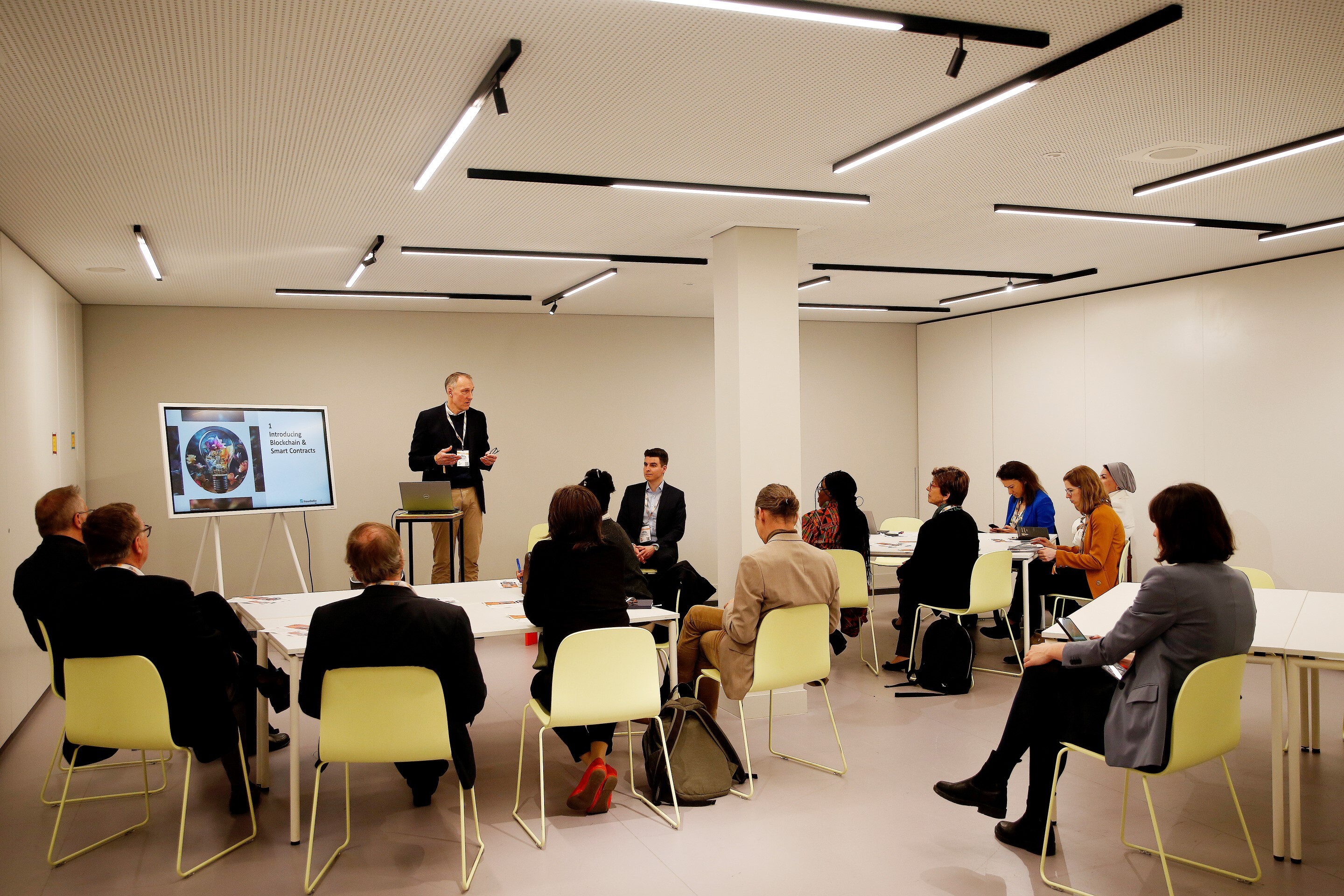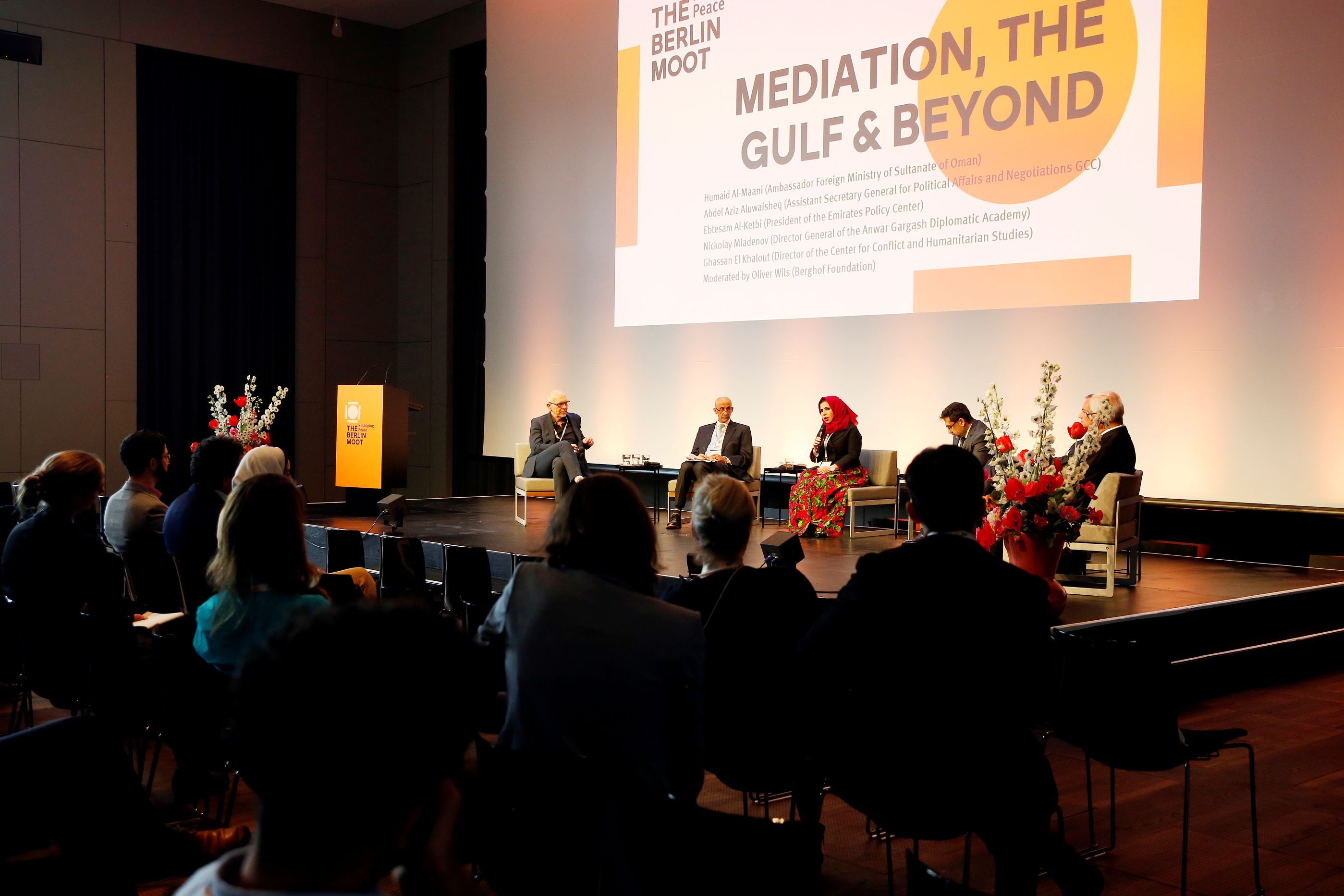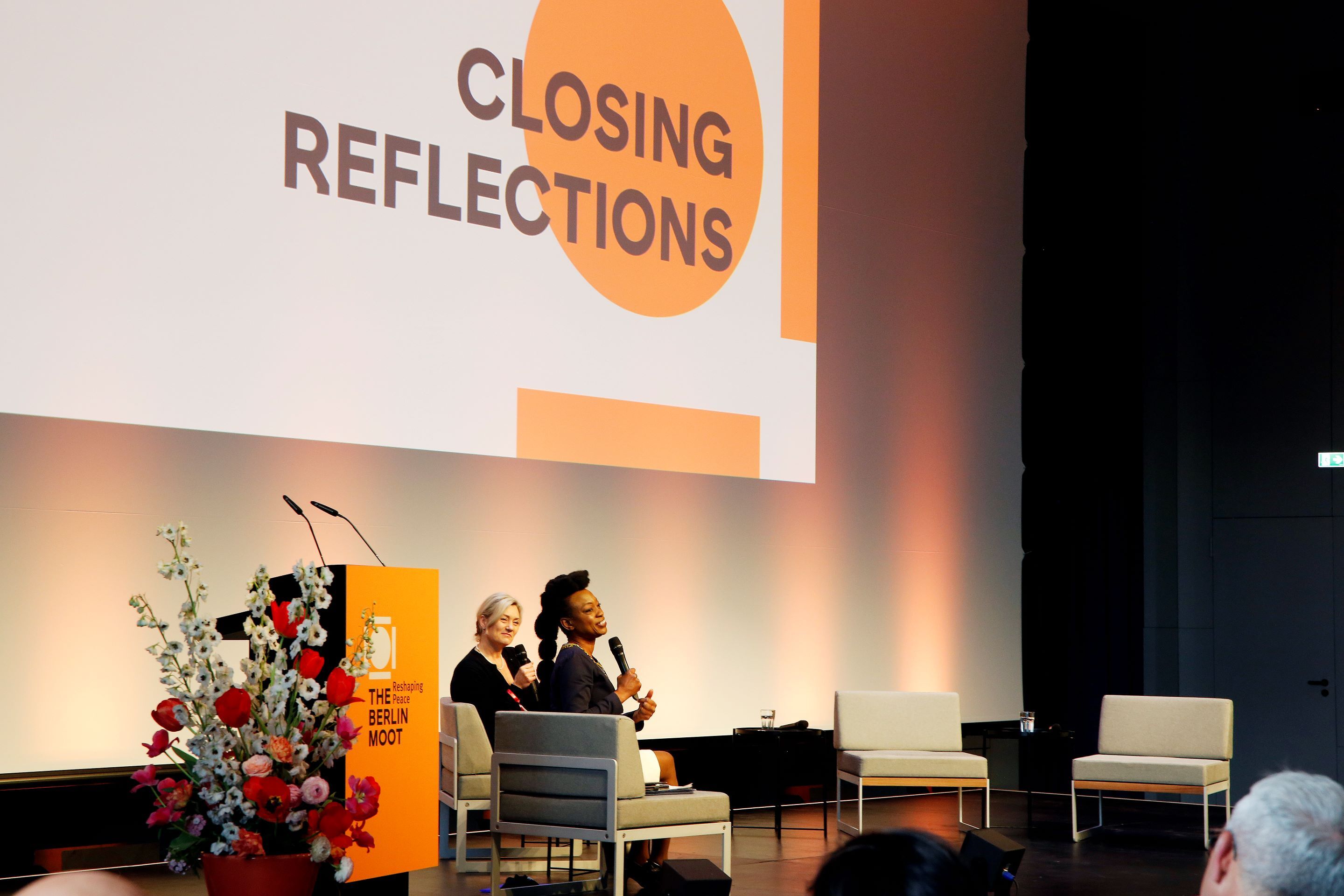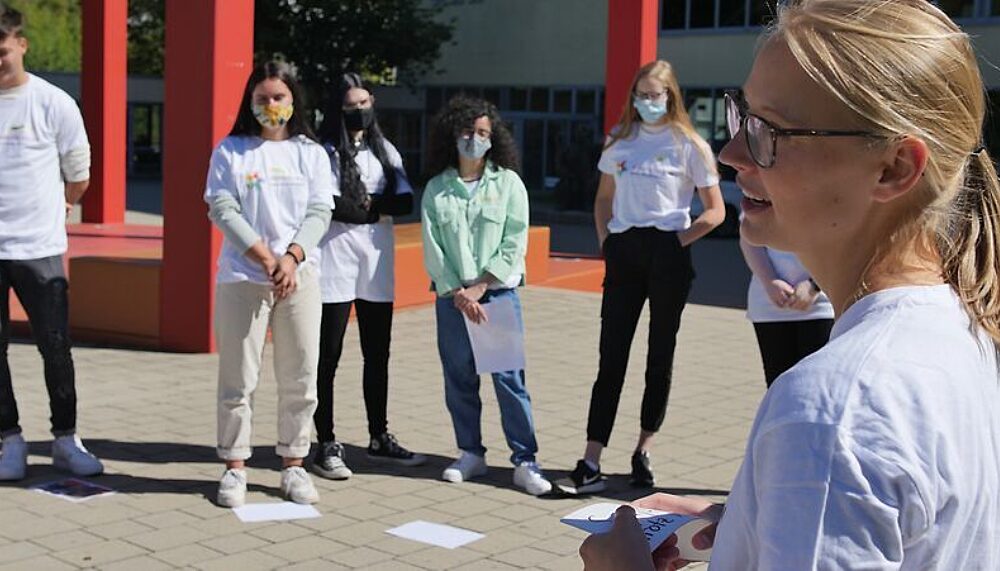FEATURE | 18 Apr 2024
Day two of The Berlin Moot: "We don’t need more policies, we need more implementation."
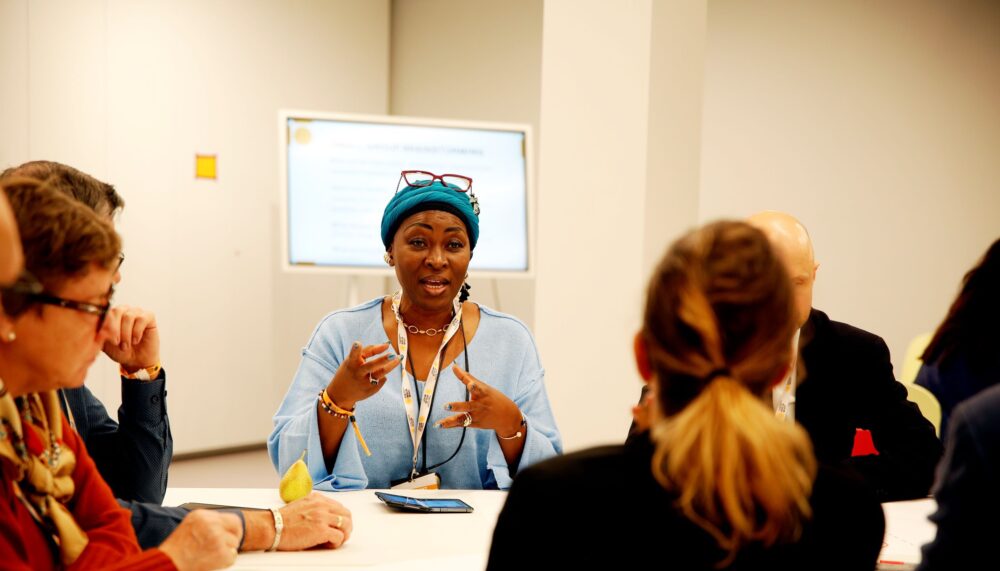
We concluded the inaugural edition of The Berlin Moot with a call to take action in reshaping peace. Read takeaways from day two.
- In these times of alarmingly escalating conflicts, we need to focus on action rather than policies
- Reshaping Peace conference ends after two days of fruitful discussions on how to innovate peacemaking with around 350 participants from more than 50 countries
- As new actors increasingly mediate conflicts, let’s learn from each other and cooperate globally
- Technologies such as blockchain and AI promise to be gamechangers for negotiators and peacemakers
- Chris Coulter, Berghof Foundation’s Deputy Executive Director, hopes for a follow-up Berlin Moot in 2026
On day one, we heard that a new approach to peacemaking is needed to address the current complexity of war and conflict. We also heard that we should stop thinking in silos and that meaningful representation of women in peace negotiations and decision-making processes needs to be enhanced. You can read yesterday’s recap article here.
Changes in peacemaking are not only needed to deal with ongoing conflicts but also to ensure that the solutions lead to sustainable peace.
Enhancing the effectiveness of peace processes
In recent years, too many peace processes have lost their effectiveness. Often several peace processes happen in parallel, sometimes peace actors collaborate, at other times they compete with each other even though they aim at resolving the same conflict. Global powers that have long acted as third-party mediators have also lost their previous standing in supporting conflict resolution.
Conversations on Yemen and Sudan at The Berlin Moot focused on what a common vision and strategy among peace actors could look like. Concrete recommendations for ongoing mediation efforts of the United Nations in Yemen and the European Union in Sudan were shared with the special envoys and their teams.
Discussions on those two countries also highlighted that formal and informal mediation efforts need to be complementary. Participants emphasised that a peace deal is not enough. Real success can only be achieved when a peace agreement is actually implemented.
Takeaways:
- Focus on humanitarian measures and short-term conflict resolution while developing a long-term vision for the peace process
- Ensure national ownership of the peace process while acknowledging the internationalised nature of conflicts
- Ensure that all relevant actors are identified and involved in the process
Implementing peace agreements successfully
50 per cent of all peace agreements fail within a decade. That is why we brought together peacemakers from around the world to find new ways to make peace agreements work, and last.
The conference looked into how challenges can be overcome to ensure the implementation of peace agreements. For example, finding out how much public support spoilers have can be useful for finding effective ways to deal with them. Including institutions like the education system or the church can help to get buy-in from all relevant actors. Securing funding for the implementation of the peace process, for as long as it might take, is important to make sure it can be seen through.
One PeaceLab also looked into how blockchain-based smart contracts could support the implementation of peace agreements. An idea that came up was that blockchain networks could be used to guarantee the traceability of conflict minerals. By using blockchain technology, trust could be decentralised: we would not have to trust one certificate as proof of origin, but the blockchain network itself would vouch for it.
Additional takeaways from the discussion:
- Take risks and try innovative solutions, instead of sticking to textbook approaches
- Effective communication is needed to ensure that agreements are widely accepted
Emerging actors and their role in brokering deals
Qatar is currently supporting efforts to reach a ceasefire in Gaza, the United Arab Emirates have recently started mediating between Russia and Ukraine, and Saudi Arabia has hosted a peace summit on Ukraine.
In today’s panel on mediation, the Gulf and beyond, panellists discussed that mediation approaches are deeply rooted in the region’s culture and history. For all Gulf countries de-escalation in the region is key to achieving their ambitious economic transformation goals to move to post-oil economies.
Panellists agreed that there is no Gulf approach to mediation. However, speakers highlighted commonalities like building long-term relationships, being pragmatic and bringing leverage to the table.
Takeaways:
- The Gulf states are playing a growing role in conflict mediation and perceive this to be in their national interest and rooted in their cultures.
- De-escalation in the region requires talking to everyone
- Regional stability and cooperative relations are a shared interest, especially since the upheavals of the Arab Spring and the growing threat of extremism
- Mediation in the Gulf is here to stay: Gulf countries are strengthening institutional capacities and training a new generation of mediators
A gender-responsive recovery in Ukraine
Today's last panel featured discussions with experts including Elisabeth Prügl, Professor of International Relations at the Geneva Graduate Institute, Tetiana Kyselova, Advisor at the Ukrainian Community of Dialogue Practitioners, Kateryna Levchenko, Government Commissioner for Gender Equality Policy at the Cabinet of Ministers of Ukraine, and Eldridge Adolfo, Senior Advisor for Dialogue and Mediation at the Folke Bernadotte Academy, on the intricacies of gender-responsive recovery in Ukraine amidst ongoing conflict. Panellists highlighted that recovery efforts are already ongoing and should integrate gender-responsive strategies to be effective in both conflict resolution and the prevention of intra-Ukrainian conflict after a potential settlement. Such an approach would focus on the needs and interests of the community rather than be an exercise in a top-down planning. Kyselova noted: “You will rebuild different things if you ask the communities”. Levchenko stressed the importance of an all-system approach including investment in the care economy and making sure gender-responsive budgeting trickles down to the municipal level.
Takeaways:
- Recognise gender-responsive recovery as an ongoing necessity and as a conflict prevention tool, not merely a post-conflict activity
- International partners should increase their support for existing local responses
- The upcoming Ukraine Recovery Conference in Berlin in June should not only focus on the physical reconstruction of infrastructure. There is an urgent need to include the human dimension as well.
Thank you for following our updates in the past two days. More analysis of the outcomes and key recommendations from the conference will follow soon.
The Berlin Moot in the media
- "Traditional ways of restoring peace no longer really work, at the Berlin Moot we are looking for improvements." says Executive Director of the Berghof Foundation Andrew Gilmour. (Tagesschau)
- A conference calls for women at the head of the UN and more involvement of civil society. (Frankfurter Rundschau)
- Luxshi Vimalarajah spoke about the importance of mediation on Swiss public radio (SRF4)
- An international conference in Berlin brings together people from all over the world who are professionals in the field of conflict resolution. (Rheinische Post)
Have a look at X, Instagram, LinkedIn and our hashtag #TheBerlinMoot for more impressions of the conference. You can also watch the livestream of day one here.
Sign-up to our newsletter to stay updated on the Berghof Foundation’s events and work.
Media contact
You can reach the press team at:
+49 (0) 177 7052758
email hidden; JavaScript is required
